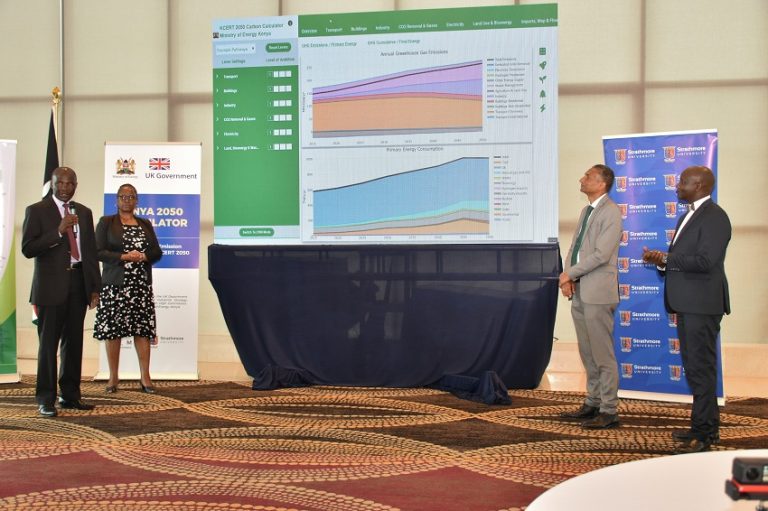The Kenya Carbon Emission Reduction Tool (KCERT 2050) has been launched and is aimed at reducing Green House Gas Emissions (GHG) as well as creating a resilience to climate change in the country.
Speaking at the launching event on Wednesday, of Energy Principal Secretary Dr. Gordon Kihalangwa stated that this was a first of its kind in the East Africa region and it will provide an accessible, trusted, and transparent platform for Kenyan policy makers, decision makers and administrators to realize Kenya-based solutions to climate change.
“We as a Ministry are mandated to spearhead the development of the energy sector by ensuring the provision of clean, sustainable, affordable, reliable and secure energy services at minimal cost, while protecting the environment,” he said.
The PS noted that the Kenya Vision 2030 aims to transform Kenya into an industrialized middle income country, which hinges on the ability to develop a low carbon climate resilient pathway.
“Efforts like improving energy efficiency in the manufacturing sector, use of energy efficient electric vehicles and ensuring an electricity supply mix based mainly on renewable energy are all aimed at promoting clean and energy-efficient practices,” he stated.
Kihalangwa noted that the 2050 Calculator is an interactive energy modelling tool that helps governments plan their low-carbon transition in an interactive, stakeholder-focused and evidence-based way.
“The approach consists of a multi-sectoral system modelling that allows experts and non-experts to develop and explore different energy and emissions scenarios up to 2050,” said the PS.
Climate & Environment Adviser at Foreign Commonwealth & Development Office, British High Commission, Anne Anwenyi stated that the tool will support government departments in Kenya to design and deliver evidence-based inclusive policies on emissions reductions, energy access, and matching energy supply and demand.
“I look forward to Kenya acting as a pioneer in championing the use of this innovative tool that will provide options for implementing Kenya’s emission reduction strategies and achieving net-zero development pathways by 2050,” she added.
At the same time, Head of Data Science and Analytics at Strathmore University Dr. John Olukuru noted that the Kenya Carbon Emission Reduction Tool (KCERT) 2050 is an important data driven policy making tool in climate change.
“It will help every Kenyan, expert or non-expert, to engage in a well-informed climate change debate,” said Olukuru.
By Fred Odanga Azelwa.
